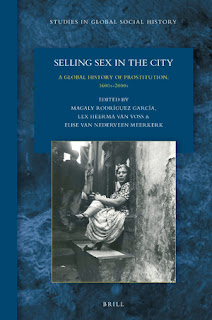Suppose you are a student and want to write a paper or thesis on a topic relating to the history of prostitution. Or you are an author and want to write a historic novel on the subject. This edited (hand)book will be a good basis to start getting ideas and reducing those to a feasible project. And the best thing is that the e-book version is now freely available online (= open access) via this link. What is the book about and what are my observations on it?
"Selling Sex in the City offers a worldwide analysis of prostitution that takes a long historical approach which covers a time period from 1600 to the 2000s." (Source: Brill)
Urban prostitution
The book is the result of a project that compares the labour history of prostitution in 23 cities worldwide, including; London, Amsterdam, Buenos Aires, Chicago, Nigeria, and Sidney. The research is mainly based on existing literature. This could explain why the focus on each city varies in time and topic. Some contributors discuss extensively their city in the nineteenth century, others choose the pre-modern ages or the 20th century. Equally, some describe commercial aspects, others choose regulations, geography, or social history.
Themes
The second part of the book is a comparison of these cities across time in themes, including labour relations, living and working conditions, migration, colonies, gender, organization of sex work, social profiles of prostitutes. In the conclusion, broad comparisons on urban prostitution through history are made. It discusses in broad strokes the way urbanization, industrialization, migration, colonization, and globalization shaped the history of prostitution.
Some observations
When reading this really impressive and extensive overview of the world history of urban prostitution, one would assume it covers all aspects of the topic. I do have a few remarks on this, though.
First, I wondered why Bruges was included as the "city of sin" for Belgium. Surely Antwerp or Brussels are much more likely to include in such an overview. Especially the latter where the term "white slavery" caused worldwide headlines years before Jack the Ripper dominated the news or William Stead published his "Maiden Tribute".(1)
Second, I noticed that prostitutes in this work are placed in the spotlight on stage. Their stories revolve around their motivation to enter prostitution, where they worked in the city, how society responded, and institutional consequences. One would, however, expect in a book about the selling of sex another lead as well: the men and women organizing prostitution businesses and the changes over time. They are there in the book, but never in the lead. Presented to what feels like the "extra" on stage instead of the protagonists. Since the book is mainly based on literature, this is probably a logical explanation for their absence. Not much research has been done on the organization of prostitution from the point of view of the prostitution business owners. They are seldom viewed as entrepreneurs and moreover often described as "exploiters".
So...
In general, this impressive book has successfully included prostitution in the history of work. But it also revealed a crucial element missing in research on the topic: the history of prostitution business owners within this labour framework. The perfect topic for my PhD :-)
Notes




Comments
Post a Comment